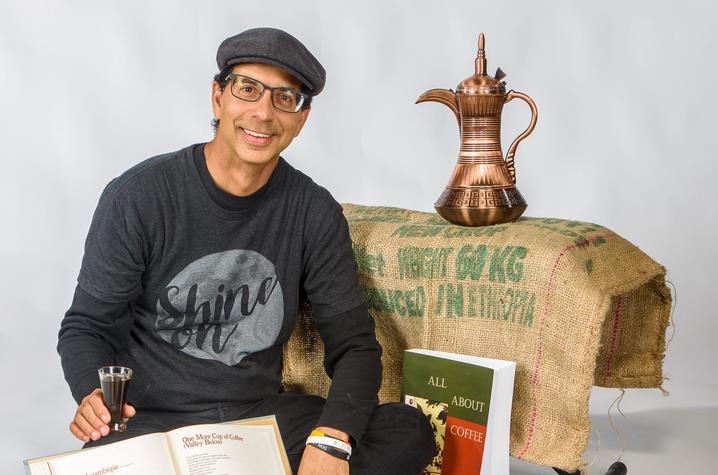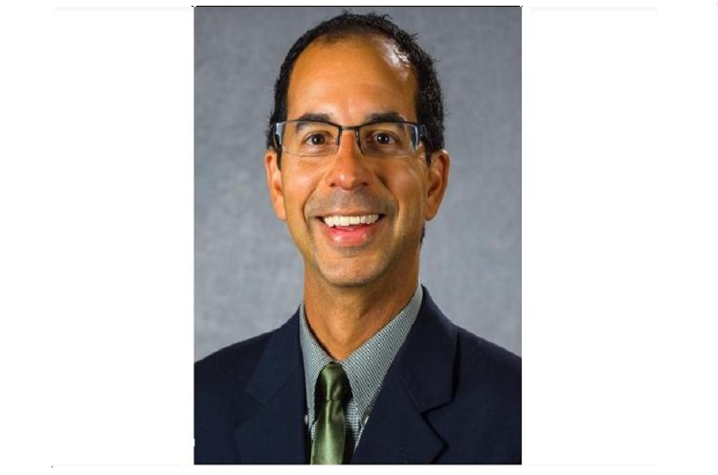New UK center dedicated to former CAFE professor
LEXINGTON, Ky. (Aug. 24, 2022) — Michael Goodin was an integral faculty member of the University of Kentucky College of Agriculture, Food and Environment for nearly two decades before his sudden passing in 2020. To honor Goodin’s legacy, his colleagues and former students will host a ceremony Aug. 29 for the UK campus community to dedicate the Dr. Michael M. Goodin Center for Agricultural Fluorescence-Microscopy Experimentation and Biological Imaging. The center, which houses a confocal microscope that Goodin worked tirelessly to obtain, will transform plant and animal research.
Goodin taught a wide variety of graduate and undergraduate courses in plant pathology and agricultural biotechnology, and held several key administrative positions in the agricultural and medical biotechnology program.
“Hundreds of students enrolled in his classes affectionately called him ‘Dr. G.’ and he took great pride in broadening students' horizons through sharing stories from his travels, explorations of his photo journals and discussions based on his popular science blog 'The Green Orange Café,'” said Lou Hirsch, Goodin’s colleague in the Department of Plant Pathology. “On his blog, he published thought-provoking essays that drew important connections between science and other aspects of life.”
The Jamaican-born researcher was an internationally respected expert on virus diseases in plants. Goodin used viral proteins tagged with fluorescent proteins and the model plant Nicotiana benthamiana to understand more about how viruses manipulate their hosts and produce disease symptoms. He was particularly interested in viral proteins that target the plant nucleus and how those proteins engineer the plant for susceptibility. Through his work, he created tools that scientists now use worldwide to study how viral proteins and plant proteins interact at the molecular level.
One of his most notable contributions to the university was his work in bringing confocal microscopes to CAFE and providing training in their use. The confocal microscope has an optical system based on lasers and pinholes that filters out the background outside the focal plane. This makes it possible to get highly detailed images of different parts of a three-dimensional specimen and dramatically increases the scope of the college’s research in diseases and the development of crops and livestock.
“Confocal microscopes allow the researcher to get a good view of what's happening inside of living cells,” said Lisa Vaillancourt, plant pathology professor and Goodin’s colleague. “For example, we can label different proteins with fluorescent markers and then track them in the cells. Using this microscope, you can get a very detailed view of how those individual proteins interact, where they're going and what they're doing while the plant or animal tissue is growing or responding to its environment. Confocal microscopy is an essential tool for modern biotechnology and cell biology relevant to agricultural research.
“Before Goodin came to UK, we didn’t have a confocal facility or special expertise with confocal microscopy in the college,” Vaillancourt said. “He was really at the cutting edge of bringing this technology to our college and furthering our ability to do research. His efforts directly translated into millions of dollars in funding for the college, through access of himself and other researchers to this technology.”
Goodin also taught students to use confocal microscopy through worldwide workshops, including in Brazil, Indonesia and Korea.
Among his many other interests, food and coffee were at the top of the list. He established weekly online coffee hours with undergraduates to help them process the pandemic's stresses and started a coffee-focused class accompanied by guided tastings of rare coffees. His colleagues said he took great pride in an undergraduate coffee club engaged in thoughtful discussion and that he recognized the value of different perspectives, furthering students’ understanding of the world beyond the university.
“Food and coffee were his passion,” Vaillancourt said. “For him, coffee could be a metaphor for almost everything. He could discuss any topic in relation to coffee. He loved to cook, eat and talk about foods from around the world and various cultures. He fed people constantly. He was very generous that way. Between his ability to introduce groundbreaking technology to the college and his selflessness and willingness to share so freely with his students, colleagues and friends, he is very much missed.”
CAFE will unveil the confocal microscopy center at a ceremony on Aug. 29 including two presentations by his former students, Kathleen Martin and Anna Whitfield, beginning 3 p.m. EDT in the Plant Science Building’s Cameron Williams Lecture Hall.
As the state’s flagship, land-grant institution, the University of Kentucky exists to advance the Commonwealth. We do that by preparing the next generation of leaders — placing students at the heart of everything we do — and transforming the lives of Kentuckians through education, research and creative work, service and health care. We pride ourselves on being a catalyst for breakthroughs and a force for healing, a place where ingenuity unfolds. It's all made possible by our people — visionaries, disruptors and pioneers — who make up 200 academic programs, a $476.5 million research and development enterprise and a world-class medical center, all on one campus.






